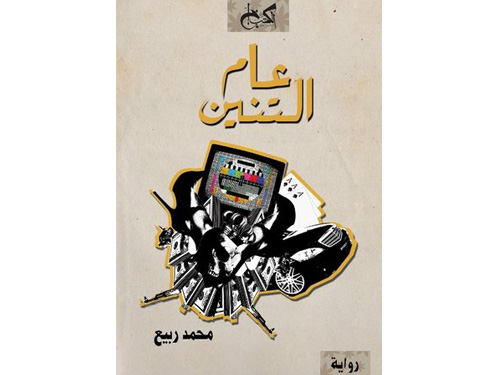“Our society annihilates us in a thousand ways on a daily basis, so we learn gradually how to get our own back from it…”
History weighs us down. Our losses define who we are. Resistance and defeat transform us equally, in their own ways. These are only a few of the ideas explored by acclaimed Egyptian author Radwa Ashour in her novel 'Specters' ('Atyaf '), published three years ago in Arabic.
The first of Ashour’s two female protagonists is a respected college professor and historian and the author of a non-fiction book entitled 'The Specters,' an account of the 1948 massacre at the Palestinian village of Deir Yassin. The second is an Egyptian novelist named Radwa Ashour, who is currently writing a novel called 'Specters,' a work of fiction about a respected college professor and historian and the author of a non-fiction book entitled 'The Specters,' an account of the 1948 massacre at the Palestinian village of Deir Yassin.
Written in the first-person, it quickly becomes impossible to distinguish between Ashour the author and Ashour the character, especially when she interrupts the narrative to express her doubts about her fictitious characters and the direction in which their story is heading. The fact that both story-lines unfold in a random–as opposed to chronological–order is also questioned by the author, who eventually concludes: “I realize now that I write by a process of association, and leave it to the pen to move like a shuttle between the past and the present.”
As a result, 'Specters' reads like two lives flashing before your eyes; events coming in no particular order, linked together by outwardly meaningless but deeply personal connections–a stream of thoughts, memories and fantasies.
“Who can separate the intertwined threads, who can separate fear of impending defeat from previous defeats?”
'Specters' is hard to categorize. It is not an autobiography, despite the fact that Radwa Ashour and her family feature heavily in the story. But neither is it a work of pure fiction, even though the college professor, Shagar Abdel Ghafar, is a fictional character. And it is not–despite assertions made in various blurbs, synopses and literary reviews–simply about Palestine.
Rather, 'Specters' is about a world in which Palestine, with all the atrocities and injustices committed against its people, exists. While Palestine definitely does feature in the novel’s dual storylines–through Shagar’s research for her book and Ashour’s recollections of, among other things, the politics that kept her and her son separated from her Palestinian husband for several years–'Specters' is ultimately about loss, oppression, and the indefinable essence of identity.
It’s a heartbreaking story of powerlessness, and the seemingly inevitable death of hope in the face of a lifetime shaped by events that are ultimately beyond our control. More than anything though, 'Specters' is about choices–a concept echoed in Ashour’s parallel story-lines and their inhabitants, and her decision to share with readers her uncertainty as an author. This uncertainty also extends to the author’s musings on the defining moments of her life.
“I have found myself at a fork in the road branching before me. I don’t know what it is I need…in order to make a choice between the two paths. The possibilities have multiplied, the threads have become tangled, and it seems that they become more knotted each day, while I am as yet not even able to distinguish safety from calamity.”
A lifetime of possibilities narrowing down to a single, limited reality; one that is “more complex than meets the eye.” In Ashour’s writing, this complexity extends to multiple levels and parallel story lines, and is manifested in the scenes and situations of a fictional existence. 'Specters' indirectly questions the nature of the mind and soul, the body and its shadow, the captive and the companion, and the ties that bind them both.
Originally published in Arabic in 1999, 'Specters' has only been recently translated into English. While it’s inevitable that the process of translation will, to some degree, compromise at least some of the nuances and hidden meanings in a literary work–especially in a largely experimental novel/’memoir’ such as 'Specters'–this is one work that clearly benefits from the attention and obvious passion given to it by its translator, in this case Barbara Romaine, who previously translated Ashour’s 'Siraaj: An Arab Tale.'
Romaine chooses her words well, keeping the prose concise, clear and poetic, whether she’s translating Ashour’s musings on the linguistic origins and functions of certain words, or more traditionally dramatic events, such as both characters’ struggle with the universities in which they work–a mutual conflict that features heavily in the intertwined narratives.
In less than 300 pages, Ashour has managed to capture not one, but two lives in their entirety in a tone that powerfully mutates from sorrow to frustration to outright rage. Despite the hardships described and genuine heartache evident in her writing, Ashour never succumbs to bitterness, and occasionally writes of fond memories–real or imagined–if only to highlight the disappointment and grief that are sure to follow.
“It wasn’t all sorrow and grief, but rather a life full of interwoven, prickly strands, containing the meat of the hazelnut.”
As its title suggests, 'Specters' will haunt readers with a delayed impact that will slowly and quietly devastate long after it goes back on the shelf. This is a book about the personal questions, frustrations and defeats that we will all inevitably take to our graves.
'Specters' is published by AUC Press.




